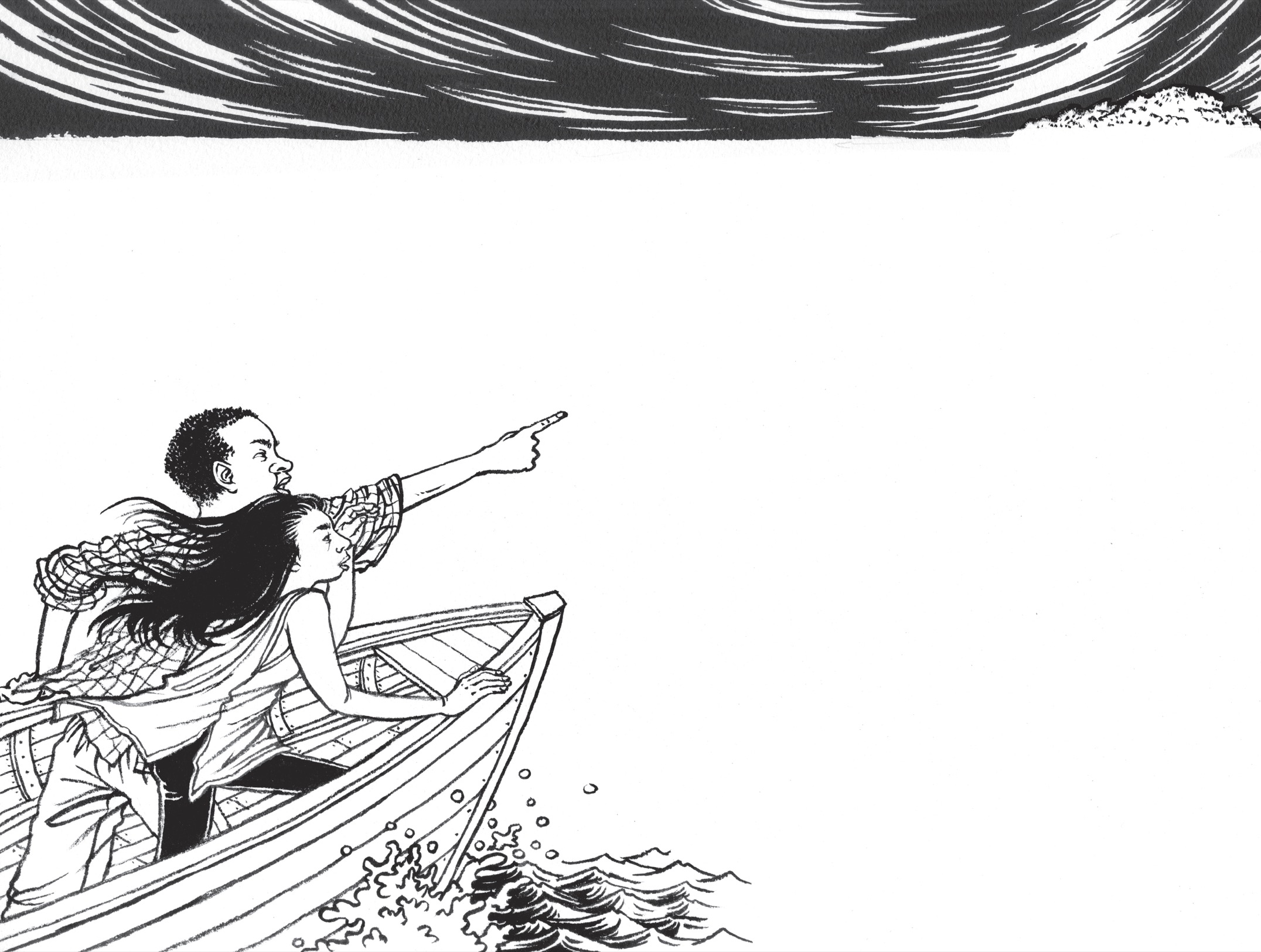10
ARTIE. THE PRESENT.
IT SEEMED like every time she decided maybe he wasn’t too bad, he did something nosy and pushy, like he was trying to get to know her. Know her know her. Not just “how are you?” kinds of questions but ones that would require her to tell things she didn’t want to tell. Say things she didn’t want to say out loud.
She just wanted to be left alone. Was it so much to ask?
After he asked what was in her luck pouch, they didn’t talk for the rest of the day—not more than please and thank you. So civil. Putnam slept in the cabin that night, though, and it was good that he did, for even inside, the air was chilled, despite the heater they ran all night long. By morning its battery was nearly dead, only faint heat radiating from the machine.
Artie finished whittling her flute, but she didn’t play it. The morning dawned gray and gloomy—the heater battery, attached to the roof of the cabin to recharge, sluggishly sucked up what little sunlight there was. They sat inside, each wrapped in blankets, shivering and hoping the heater would be usable again by night.
After lunch Putnam started chatting about unimportant topics, as if he was trying to bring back yesterday’s friendly feel. But Artie had learned her lesson: don’t talk about surface stuff, and you won’t be asked about deep stuff. She got up without speaking, wrapped the blankets tight around herself like a shroud, and stepped out.
On the deck, she sat against the cabin wall that seemed to be mostly out of the wind and pulled her knees to her chest, tucking the blankets around herself. She stared off into the distance. The ocean was so gray that it melted into the sky, and it was almost impossible to see the faint horizon where the two bodies met. They faded into each other like they were one. Not two separate beings at all.
The answer to Putnam’s question was actually very simple. Her luck pouch had nothing in it.
Nothing.
Other people—everyone she knew—had lucky things that had come to them in different ways: a keepsake from a parent, a little reminder of why they had been given the name they had, some small trophy from an important day, tokens of special things and special people.
Her luck pouch had once held something special: a little jeweled ring her mother had worn as a child and had given to Artie just before she died. But this past winter when they were low on food, Artie’s stepfather had told her to hand it over. She’d refused. Said she’d rather go hungry. Her stepfather had slapped her and reached right into the pouch as it hung on Artie’s neck and taken the ring.
It didn’t even buy that much food.
As for any other items in her luck pouch? She’d been waiting, ever since her mother’s death, for something to happen, some good sign, that she could keep a reminder of. There were so many bad things or sad things. Some people put things like that in their luck pouches: a lock of hair from someone who’d died, or a snip of a blanket from a long illness. But she wasn’t going to. Someday, she told herself, there would be good luck. That was what a luck pouch should be for. Remembering the good past. Not the bad.
But there never was any good luck. There was only her, standing up for herself and getting beaten down. And standing up again.
And then she ran away, and she felt like maybe her luck might change, and when she found the shell and saw its gleam inside, like a cleaned bone but shimmering, she felt like maybe her luck had changed—and the shell might be a sign of it. But in the light of the next day, she thought, No. Things could still go wrong. She wouldn’t collect anything until she was sure. Then there would be an item so right, so obvious, that it would of course go in her luck pouch.
Until then, it would hang empty around her neck, a little container of nothing. Just like herself.
SHE SAT FOR A LONG TIME, knees pulled to her chin, blanket wrapped around her to make a cocoon, head poking out, facing seaward.
Then she startled.
What was that?
The invisible place where the gray sea met the gray sky . . . now had a dark line on its border. But only in one spot: a dash—sitting right where the horizon should be.
She squinted, then stood and shadowed her eyes with her hand, even though the sun wasn’t out. It didn’t help. The short line on the horizon neither disappeared nor grew fatter. It remained a black dash, fuzzy in the distance.
Artie swung into motion. The way they were moving with the current, they would miss it—and it was the first possible island they’d seen since they left her homeland. She grabbed the rudder and steered them out of the current. The current was wider now than it had been—no longer the narrow stream that Putnam had stumbled on so many days ago—and it took her several long minutes to get into still water.
She began to hoist the sails, setting them to catch the wind and zigzag the boat toward the thing on the horizon.
Putnam popped open the cabin door and came out, rubbing his eyes like he’d just woken from a nap. “What’s going on?”
She forgot to frown. “I think we found land.”
